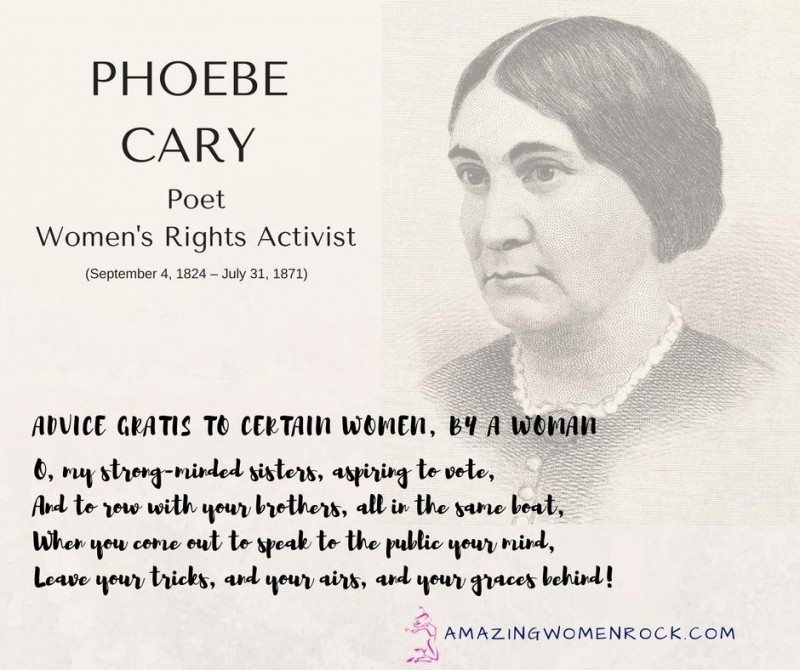Phoebe Cary (Poet/Women's Rights Activist)
Phoebe Cary (September 4, 1824 – July 31, 1871) was an American poet, and the younger sister of poet Alice Cary (1820–1871). The sisters co-published poems in 1849, and then each went on to publish volumes of her own. After their deaths in 1871, joint anthologies of the sisters' unpublished poems were also compiled.
Cary was born on September 4, 1824, in Mount Healthy, Ohio near Cincinnati, and she and her sister Alice were raised on the Clovernook farm in what is now North College Hill, Ohio. While she and her sister were raised in a Universalist household and held political and religious views that were liberal and reformist, they often attended Methodist, Presbyterian, and Congregationalist services and were friendly with ministers of all these denominations and others.
While they occasionally attended school, the sisters were often needed to work at home and so were largely self-educated. The sisters' mother died in 1835, and two years afterward their father married again. Their stepmother was wholly unsympathetic regarding their literary aspirations. For their part, while they were ready and willing to aid to the full extent of their strength in household labor, the sisters persisted in a determination to study and write when the day's work was done. Sometimes they were refused the use of candles to the extent of their wishes, and the device of a saucer of lard with a bit of rag for a wick was their only light after the rest of the family had retired.
More outgoing than her sister, Cary was a champion of women's rights and for a short time edited Revolution, a newspaper published by Susan B. Anthony. In 1848, their poetry was published in the anthology Female Poets of America edited by Rufus Wilmot Griswold and, with his help, Poems of Alice and Phoebe Cary was published in 1849. Poet John Greenleaf Whittier had been invited to provide a preface but refused. He believed their poetry did not need his endorsement and also noted a general dislike for prefaces as a method to "pass off by aid of a known name, what otherwise would not pass current".
ADVICE GRATIS TO CERTAIN WOMEN, BY A WOMAN
O, my strong-minded sisters, aspiring to vote,
And to row with your brothers, all in the same boat,
When you come out to speak to the public your mind,
Leave your tricks, and your airs, and your graces behind!
For instance, when you by the world would be seen
As reporter, or editor (first-class, I mean),
I think -- just to come to the point in one line --
What you write will be finer, if 'tis not too fine.
Pray, don't let the thread of your subject be strung
With "golden," and "shimmer," "sweet," "filter," and "flung;"
Nor compel, by your style, all your readers to guess
You've been looking up words Webster marks obs.
And another thing: whatever else you may say,
Do keep personalities out of the way;
Don't try every sentence to make people see
What a dear, charming creature the writer must be!
Leave out affectations and pretty appeals;
Don't "drag yourself in by the neck and the heels,"
Your dear little boots, and your gloves; and take heed,
Nor pull your curls over men's eyes while they read.
Don't mistake me; I mean that the public's not home,
You must do as the Romans do, when you're in Rome;
I would have you be womanly, while you are wise;
'Tis the weak and the womanish tricks I despise.
On the other hand: don't write and dress in such styles
As astonish the natives, and frighten the isles;
Do look, on the platform, so folks in the show
Needn't ask, "Which are lions, and which tigers?" you know!
'Tis a good thing to write, and to rule in the state,
But to be a true, womanly woman is great:
And if ever you come to be that, 'twill be when
You can cease to be babies, nor try to be men!
The sisters' anthology garnered much acclaim, and in 1850 they moved to New York City. In the joint housekeeping in New York, Phoebe took, from choice (Alice being for many years an invalid), the larger share of the household duties, and hence found less leisure for literary labor. She wrote very little prose, and her poetry was so different in style, so much more buoyant in tone and independent in manner, that the verses of one sister were rarely ascribed to the other.
Alice died in 1871 from tuberculosis; Phoebe died five months later of hepatitis on July 31, 1871, in Newport, Rhode Island. Both were buried in Green-Wood Cemetery, Brooklyn, New York.
- Tags: inspiration poetry Women's Rights


